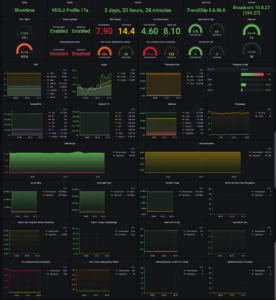In a global that often feels unpredictable, self-reliance has emerge as extra than just a buzzword; it’s a way of life. Imagine being capable of depend on your very own abilties and understanding to navigate thru challenges. Whether facing herbal failures, financial downturns, or really the normal grind, having a diverse set of abilities could make all the difference.
The concept of survival extends beyond knowing the way to make fire or forage for meals. It encompasses an array of professions that equip you with important tools and knowledge for thriving independently. This isn’t pretty much surviving; it’s approximately empowering yourself in numerous components of life.
Are you geared up to construct your skillset? Let’s dive into this survivalblog listing of professions designed to help you emerge as without a doubt self-enough.
The Importance of Diversifying Skills for Survival
In the face of unexpected challenges, having a whole lot of capabilities can make all the distinction. Diversifying your know-how enhances adaptability and resilience.
When occasions shift, relying on a single talent set can also depart you susceptible. A nicely-rounded expertise base empowers you to tackle various issues. You become more resourceful, capable of finding solutions in different scenarios.
Moreover, sharing and learning from others creates community strength. When individuals come together with varied abilities, survival becomes less daunting. Each person contributes unique insights that enhance collective readiness.
Skills like first aid or basic hunting techniques not only promote self-sufficiency but also build confidence. The ability to manage emergencies or procure food independently alleviates anxiety during crises.
Investing time in learning new trades or crafts enriches your life experience while fortifying your survival toolkit. Embracing this continuous boom mindset maintains you prepared for whatever lies in advance.
Medical Professions: First Aid, Nursing, and Emergency Medicine
When it comes to self-reliance, medical skills are invaluable. Knowing first resource can make a vast distinction in emergencies. Simple strategies like CPR and wound care empower you to act decisively while time is critical.
Nursing offers a deeper understanding of patient care. Nurses possess crucial knowledge about medications, treatments, and monitoring vital signs. This expertise can enhance your ability to handle health crises effectively.
Emergency medicine is another essential area for survivalists. Training in this field equips individuals with advanced skills to address traumatic injuries or sudden illnesses under pressure. Familiarity with triage principles allows for quick prioritization during chaotic situations.
Together, these medical professions form the backbone of any solid survival strategy. Building proficiency in these areas not only protects yourself but also helps those around you in times of need.
Agriculture and Food Production Professions: Gardening, Farming, and Animal Husbandry
Agriculture and meals production are on the coronary heart of self-reliance. Gardening, farming, and animal husbandry provide critical competencies for sustaining yourself and your community.
Gardening may be extra than handiest a hobby; it’s an critical ability that enables you to grow clean produce. Learning approximately soil fitness, crop rotation, and seasonal planting can yield a bountiful harvest.
Farming takes this concept further. Understanding larger-scale agricultural practices means you could cultivate grains or raise livestock. Awareness of sustainable methods ensures that your land remains productive for generations.
Animal husbandry is equally important. Raising chickens for eggs or goats for milk creates dependable assets of vitamins. Knowledge in breeding, feeding, and healthcare control maintains animals healthy and efficient.
These professions empower individuals to take control of their food supply while fostering independence through practical knowledge in agriculture.
Construction and Repair Professions: Carpentry, Plumbing, and Electrical Work
Construction and repair skills are vital for self-reliance. Carpentry, plumbing, and electrical work stand out as essential areas to master. Each discipline offers unique advantages in creating a sustainable living environment.
Carpentry allows you to build furniture, shelters, or storage solutions from scratch. Learning how to use tools effectively can make your space functional and comfortable.
Plumbing is another crucial skill. Knowing how to fix leaks or install new piping ensures access to clean water. It prevents costly repairs down the line while enhancing your independence.
Electrical work involves understanding wiring systems and safety protocols. Basic knowledge here empowers you to handle minor issues without calling an expert every time something goes wrong.
These creation professions not only make bigger your capabilities but also improve your self assurance in managing ordinary demanding situations that come with self-sufficiency.
Hunting and Fishing Professions: Tracking, Trapping, and Fishing Techniques
Hunting and fishing are essential capabilities for self-reliance. They offer meals, sustenance, and a deep connection to nature.
Tracking animals requires keen observation skills. Understanding animal behavior helps locate them in their natural habitat. You’ll learn to read signs like footprints or droppings, which can lead you right to your next meal.
Trapping is another vital technique. It’s not just about catching game but also conserving resources. Setting snares or using baited traps allows you to harvest without the need for constant effort.
Fishing techniques vary widely from fly fishing on serene rivers to netting in lakes or oceans. Each method has its nuances that can be mastered with practice.
Learning these professions fosters independence while respecting wildlife and ecosystems. Embracing these outdoor skills empowers individuals against unpredictable circumstances in life.
Other Essential Skills for Self-Reliance: Water
Access to clean water is crucial for survival. Knowing how to source, filter, and purify water can make a significant difference in any self-reliant scenario.
Start by identifying natural sources of water such as rivers, lakes, or streams. Understanding the local landscape helps in locating these vital resources.
Once you find a water source, filtration techniques come into play. Simple methods include using cloth or sand to remove debris and larger particles. Boiling is one of the most effective ways to kill pathogens.
Additionally, investing time in learning about rainwater harvesting can provide an alternative solution during dry seasons. Setting up barrels or containers captures precious rainfall effectively.
Familiarize yourself with basic chemistry principles that pertain to purification tablets or solar distillation methods. Embracing these skills ensures you remain hydrated when it matters most.
Conclusion
Self-reliance is a vital skill set for anyone looking to thrive in uncertain times. By cultivating a diverse range of professions and skills, you can enhance your ability to navigate challenges effectively.
The survivalblog list of professions emphasizes that having knowledge in medical fields, agriculture, construction, hunting, and fishing can transform your self-sufficiency mindset into practical capabilities. Each profession contributes uniquely to building resilience.
Water management also plays an essential role in self-reliance. Knowing how to source and purify water ensures you never find yourself without this crucial resource.
Equipping yourself with these varied skills prepares you not just for emergencies but fosters confidence in everyday life too. Explore the various paths available, invest time in learning them, and embrace the journey towards a more independent lifestyle.




